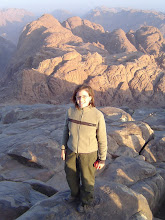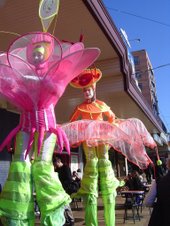Today we travelled across the Green Line. This is the common name for the border around the West Bank (border may be the wrong word, as it's yet to be agreed upon as a border - rightly or wrongly, there is no Palestinian state yet for Israel to share a border with). A quick and woefully incomplete history: The green line was originally the UN armistice line established between Israel and the Arab countries that it fought during the 1948 war of independence - Egypt, Syria, Jordan. At the end of the 1948 war, Gaza was part of Egypt, and the West Bank was part of Jordan. Israel later recaptured both of these territories during the 1967 war, and for the last couple of decades many Jewish settlers have come to live here, both in places that were historically inhabited by Jewish communities, and in newly-built settlements, strategically dotted amongst Palestinian towns and villages.
Anyone who has read a newspaper or seen a television in the past 40 years will know that the question of who is entitled to live on each side of the Green Line - and who holds sovereignty over these lands - sits at the root of the conflict between Israel and the Palestinians (intertwined with security and terrorism, religious radicalism, unfortunate political decisions, and collapsed efforts to negotiate of course). This is the iconic struggle of our times - as evidenced by the world's obsession with it. And of course, there is a lot more to the story that what one ever hears in the news. I'm putting a disclaimer here that I'm not going to be able to adequately comment on what I know about the settlements, nor what I think about them. It's too hard in a blog and I am still processing my thoughts!!!
The purpose of our trip was to visit a small Jewish settlement - Bruchin - to see what it was like, and to hear from some of the settlers why they have chosen to live here. Only an hour earlier, we met with the head of Peace Now/Shalom Achshav, an Israeli organisation that favours the dismantlement of many (but not all) settlements in exchange for security and a final negotiation of borders with an independent Palestinian State. The Peace Now representative gave, I thought, a fairly cogent analysis of the situation. His view was that even if Israel's future in giving up the Territories looks bleak, and may not lead to peace, the alternative is even bleaker. Retaining control over around 4 million Palestinian Arabs, when it's inconceivable that they can (or would want to) be integrated as full citizens of Israel as long as Israel hopes to be a Jewish State, is part of what I've heard called the "demographic argument" for the two-state Israel/Palestine solution.
But of course, things are never so simple. A two-state solution seems like the only viable solution to me, but there are so many question marks and barriers to this happening. Would a Palestinian state be economically viable? Would it guarantee a safer Israel - or, as some fear, would it create a platform for even greater violence? Would rockets and missiles begin to rain down on Israel - as they are on Sderot and Ashkelon today? Even if Israel was willing to go ahead in good faith, as history has shown, even the most comprehensive offers to date, like at Camp David and Taba have been rejected - not negotiated, rejected - by the Palestinian leadership.
We met with several women at Bruchin - these were not the crazy lunatic settlers that one might imagine from the news, but a group of pleasant and quitely well-spoken young mothers who invited us into their homes. Although they didn't express wildly objectionable opinions or attitudes, I found their reasons for choosing to live in the West Bank neither convincing nor realistic. They certainly don't see themselves as barriers to peace - as many do - but expressed a desire to just get on living peaceful lives in their peaceful settlements. At the root of their conviction is the religious belief that Jews are supposed to be living in these lands, as part of the Land of Israel given by God to the Jewish People. Although they more or less avoided representing themselves as political, of course this religious view is also tangled up into a political position as well - this land clearly wasn't just sitting there empty, ready for Jewish people to come and set up house wherever they pleased. On the other hand, it's also clear that this logic works both ways - many within the Palestinian political and religious community have made it clear that establishing a state in the West Bank and Gaza is only "Phase I", with "Phase II" being a Palestinian state that extends from the Jordan River to the Mediterranean and is entirely free of Jews.
At the end of our day, we went to visit a temporary village in Israel (undisputed Israel) where many former residents of the Gaza Strip settlements - Gush Katif - have been put while the government creeps at a snail's pace towards building them new homes and communities. I was a little surprised to find myself touched by, and sympathetic to, the situation of these people, at least as represented by one woman who spoke to us about what it was like to be forced from their community after decades of hard work and commitment to cultivating the land, with very little meaningful compensation to date. Once again, she didn't say anything that I could outright disagree with or dismiss, and there are many things about the Gush Katif communities - including their deep valuing of community life itself - which were worthy of admiration. Last year, I thought that the unilateral disengagement from Gaza was both inevitable and neccessary. I pretty much still think this, but looking at Gaza today, it is hard to see how exactly the withdrawal has made things better (again, for complex reasons). Today, even more than before, I feel sad about the minorly and majorly tragic impacts of the conflict on so many people - Israeli and Palestinian. And that's about as good a summary as I can give right now.
Sunday, May 27, 2007
Subscribe to:
Post Comments (Atom)


Hello Rach,
ReplyDeleteI have discovered your blog after seeing you on facebook - so nice to know all is well and you are having fab advantures.
Liz Bell
O my darling Rachel. Didn't you know it's all so easy to figure out - the good guys wear the white hats and the bad guys wear the black hats - isn't that right?? ha ironic ha reality ha.
ReplyDeletehey rach, interesting summary!
ReplyDeletei finally found time to rediscover your blog and it full of interesting things for me to read at midnight :-)
have fun!